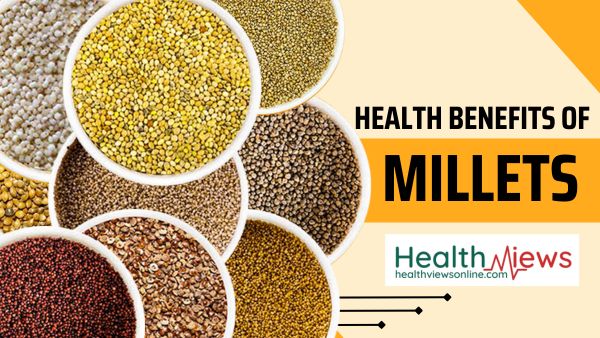A family of small-seeded grasses with a wide range of characteristics known as millets are commonly cultivated as fodder and cereal crops worldwide. Some of the earliest Yajurveda texts in India mention millets, naming foxtail millets (priyangava), Barnyard millet (aanava), and black finger millet (shyaamaka), indicating that millet use was widespread and predates the Indian Bronze Age (4,500BC). Here, check out the health benefits of millet.
Health Benefits Of Millet
Millet Controls Diabetes
One of the very important health benefits of millet is that, these healthy foodgrain have a low glycemic index, which slows down digestion and maintains a steady blood sugar level. Millets improve insulin sensitivity in diabetics and also help non-diabetics, particularly those with type 2 diabetes, control their blood sugar levels.

Millet Decreases High Blood Pressure
Millet contains magnesium, which helps to lower blood pressure by relaxing the muscles that line the inside of the arterial wall. Additionally, millet lessens the intensity of asthma attacks and the frequency of migraines.
Also Read: 8 Reasons Why Your Blood Pressure Shoots Up
Millet Helps In Relieving Menstrual Cramps
For women who experience excruciating agony and cramps throughout their menstrual cycle, millet is an excellent diet because of its high magnesium content.
Millet Aids Breast Milk Production
It is recommended that pregnant and nursing women drink large amounts of ragi to boost their bodies’ production of breast milk. This makes it possible for the mother to feed the infant for a longer duration.
Millet Helps In Weight Loss
Tryptophan, an amino acid found in almost all millet, help people manage their weight by reducing their appetite. It digests more slowly and keeps the stomach fuller for longer. Millets are strong in fibre and immediately satisfy hunger, limiting overeating. Millets should be a part of at least one of a person’s primary meals if they wish to reduce weight. There are several forms of millet available for weight loss, including foxtail millet, Kodo millet, finger millet, and pearl millet.

Millet Reduces Risk Of Colon Cancer
Fibers and phytonutrients are both present in foxtail millet, and it is thought that this combination lowers the incidence of colon cancer. A phytonutrient found in millet called lignan is transformed into mammalian lignan in the colon, which offers breast cancer protection. The risk of acquiring breast cancer can actually be reduced by 50% by eating millet.
Millet Helps In Slowing Down Muscle Degradation
Lysine, an amino acid that slows down muscle deterioration and aids in the development of leaner muscles, can be found in millets, which are high-protein cereals.
Also Read: Health Benefits Of Aloe Vera: Medicinal Uses, Precaution & Side Effects
Millet Aids In Sleep
The serotonin level in the body is increased by the tryptophan in millet, which aids in lowering stress. Having a cup of millet porridge each night helps promote restful sleep.
Nutrition And Nutritional Values Of Millet
According to the National Nutrient Database of the United States Department of Agriculture, Millet has the following nutrients (USDA).
- Total Fat 1g
- Saturated Fat 0.2g
- Sodium 2mg
- Total Carbohydrate 23.7g
- Dietary Fiber 1.3g
- Total Sugars 0.1g
- Protein 3.5g
- Iron 0.6mg
- Calcium 3mg
- Potassium 62mg
- Phosphorus 100mg
Also Read: 10 Types of Millets for Better Health and Nutritious Diet
Side-Effects Of Millets
Millets can be safely ingested in moderation. Over the course of thousands of years, it has been a staple diet for millions of people. However, millet may have negative effects if consumed in excess. Millets contain goitrogen, a compound that prevents the thyroid gland from producing thyroid hormones and prevents the thyroid gland from absorbing and using iodine. Iodine shortage is a serious medical issue that can result in goiter, an enlargement of the thyroid gland. Goitre causes dry skin, anxiety, depression and slow thinking.
Also Read: Manjistha Medicinal Uses, Manjishtha Health Benefits, Nutrition





